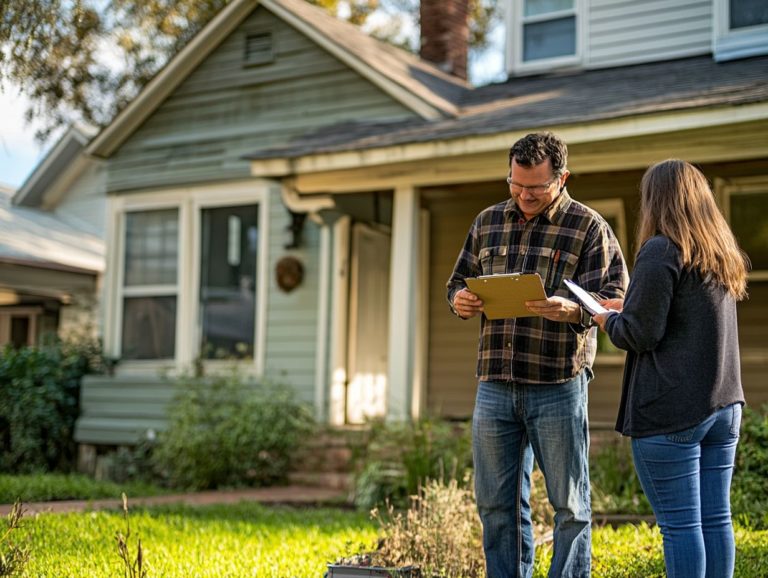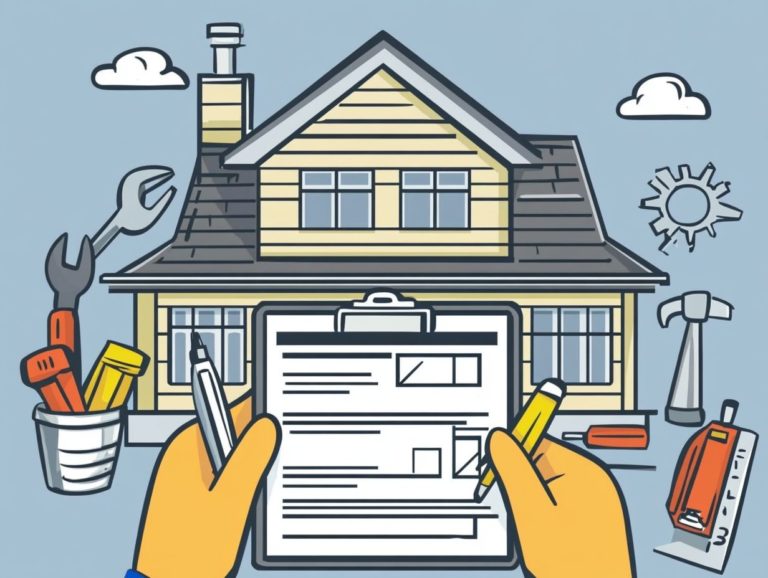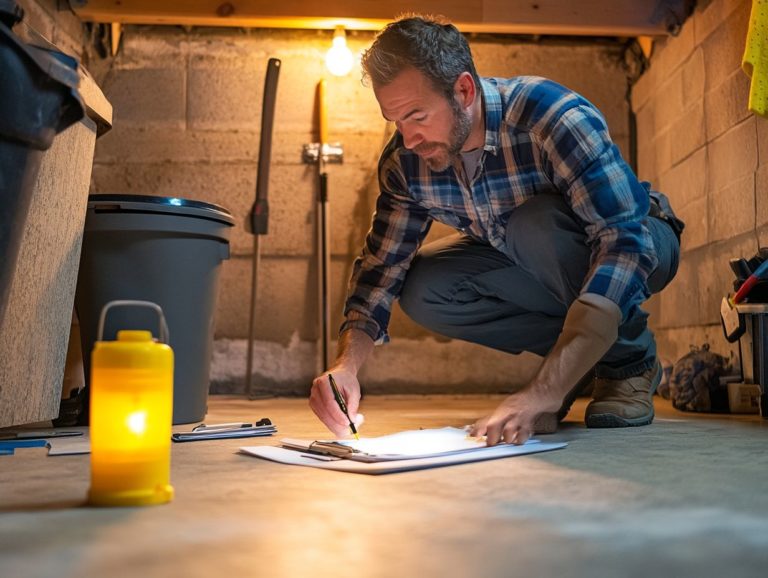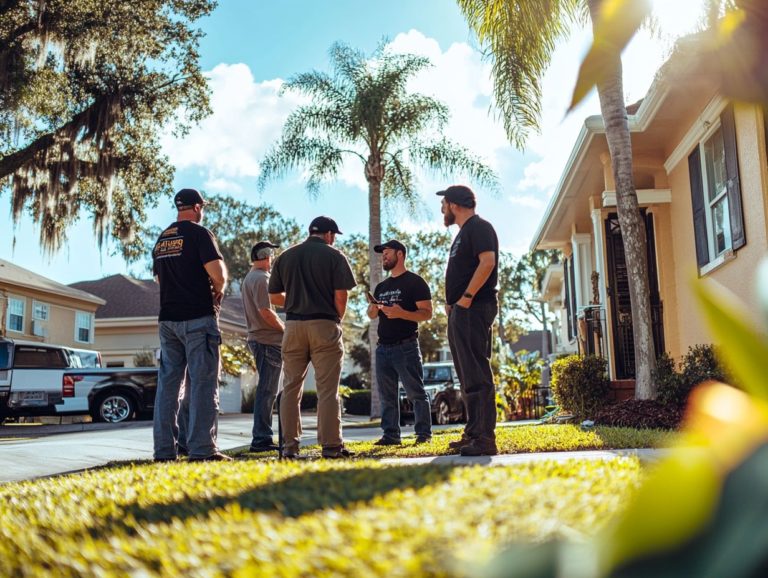The Benefits of Attending Your Home Inspection
Buying a home is one of the biggest investments you’ll make. Understanding its condition is crucial.
This article explains what to expect during a home inspection. It highlights why your presence is important and offers tips to address any issues.
Whether you re a first-time homebuyer or selling your home, understanding these aspects builds your confidence. You ll navigate the home-buying journey with clarity.
Contents
- Key Takeaways:
- Understanding the Purpose of a Home Inspection
- What to Expect During a Home Inspection
- The Benefits of Attending Your Home Inspection
- Addressing Issues Found During the Inspection
- Maximizing the Value of Your Home Inspection
- Frequently Asked Questions
- What are the benefits of being at my home inspection?
- How will attending my home inspection guide my purchase decision?
- Can attending my home inspection save me money in the long run?
- Will I have the chance to ask questions during the home inspection?
- Can attending my home inspection help me plan for future maintenance and repairs?
- Is it necessary for both buyers and sellers to attend the home inspection?
Key Takeaways:

Discover why a home inspection is essential and how it protects your investment!
Be present during your home inspection to learn about potential issues and address them with the inspector.
Maximize the value of your home inspection by following tips for getting the most out of the process.
Understanding the Purpose of a Home Inspection
Understanding the purpose of a home inspection is vital for you as a prospective buyer. It reveals potential safety risks and property issues that could affect your home s value and your long-term satisfaction.
A thorough home inspection provides you with crucial insights into the condition of the property. This helps you sidestep future headaches and the dreaded buyer s remorse.
This inspection can also lead to negotiation opportunities with sellers. It helps you secure suitable home insurance. This gives you peace of mind during the purchasing process.
What is a Home Inspection and Why is it Important?
A home inspection is an essential, in-depth evaluation of a property’s condition. This process examines everything from structural integrity to maintenance requirements, making it a crucial step in your buying journey.
During this thorough review, inspectors meticulously assess various elements, including the roof, plumbing, electrical systems, and foundation. These details are vital in uncovering potential issues that could affect both the safety and value of the home.
The resulting inspection report becomes a key tool for you as a prospective homeowner. It offers insights that can enable you to negotiate repairs or adjustments to the sale price. By comprehending these components and their implications, you position yourself to make informed decisions about your investment.
What to Expect During a Home Inspection
During a home inspection, you can anticipate a thorough assessment of home systems, including Heating, Ventilation, and Air Conditioning (HVAC), plumbing, and electrical components.
These elements play a pivotal role in evaluating the property’s overall condition and identifying any potential risks.
The Inspection Process and What the Inspector Looks For
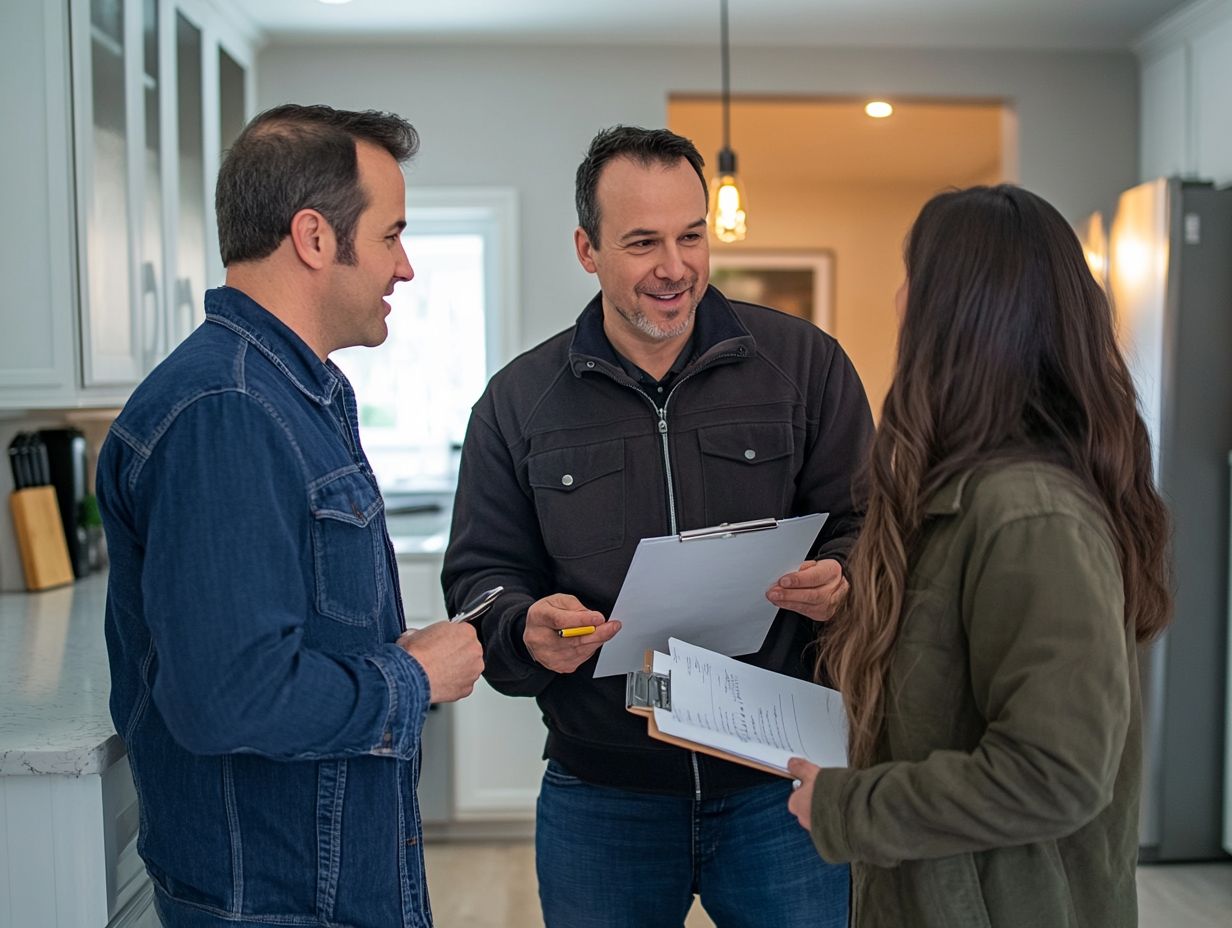
The inspection process requires a systematic review of various elements in your home, including electrical systems, foundation integrity, drainage systems, and potential pest infestations.
This comprehensive evaluation is vital for identifying potential hazards that might lead to costly repairs down the line. Inspectors utilize a range of methods think visual assessments, thermal imaging, and moisture detection tools to thoroughly analyze the condition of each component.
For example, they carefully look for signs of water damage in the foundation and scrutinize wiring for safety compliance. Using specialized techniques, inspectors can uncover the presence of termites or other pests, which could compromise your home’s structural integrity.
By proactively addressing these issues, you can mitigate risks and make well-informed decisions about your property investments.
The Benefits of Attending Your Home Inspection
Attending your home inspection presents invaluable benefits for you as a prospective buyer.
You’ll get firsthand insight into the inspection results, enabling you to address concerns and navigate repair negotiations with greater confidence and effectiveness.
Taking part in your home inspection is a smart move. It empowers you to make informed decisions and ensures you understand your potential new home inside and out, especially when you consider the benefits of home inspections.
Why You Should Be Present During the Inspection
Being present at the home inspection lets you see the process firsthand. This knowledge can significantly enhance your negotiating position. Understanding the importance of attending your home inspection is invaluable; it provides you with a clear understanding of immediate repairs or long-term maintenance costs that may arise after your purchase.
By grasping these details, you can make informed decisions and potentially save thousands of dollars by sidestepping unexpected expenses in the future. The chance to ask the inspector questions in real time helps you understand better not only the property s condition but also various solutions for effective maintenance.
This approach builds your confidence when buying. It allows you to engage in discussions about repair responsibilities with sellers, ultimately leading to smoother negotiations.
Addressing Issues Found During the Inspection
It’s crucial to address issues found during a home inspection. This not only enhances your understanding of the property but also opens up valuable negotiating opportunities with sellers, especially when structural concerns or pest control problems arise.
This proactive approach enables you to make informed decisions and potentially secure a better deal.
How to Handle Defects and Negotiate Repairs

Handling defects revealed during a home inspection calls for strategic negotiation skills. Leverage the inspection report effectively to address necessary repairs and minimize property risks.
When you approach the seller, present a well-organized list of findings to clearly convey your concerns and expectations regarding repairs.
Focus on safety issues first, such as electrical or plumbing problems. Be open to discussing less urgent repairs as potential areas for compromise.
Establishing a reasonable budget for repairs can greatly enhance your negotiation position. This allows you to offer the seller alternatives, such as credits toward repairs or incorporating specific repair work into the contract.
By focusing on collaboration rather than confrontation, you can foster a positive dialogue that leads to a satisfactory agreement for both parties.
Maximizing the Value of Your Home Inspection
To maximize the value of your home inspection, it’s essential to fully grasp the benefits of a home inspection before selling. This includes uncovering opportunities for enhanced energy efficiency and collaborating with reputable inspection services that can expertly guide your future restoration projects.
Tips for Getting the Most Out of Your Inspection
To maximize the benefits of your home inspection, consider using a detailed checklist that addresses common buyer concerns. Additionally, understanding the benefits of home inspections for sellers can help highlight energy efficiency measures that can reduce future maintenance costs.
By carefully reviewing the inspection findings, you can proactively tackle issues such as outdated HVAC (heating, ventilation, and air conditioning) systems or insulation inefficiencies that often come to light during the assessment.
Taking these steps enhances your comfort and can significantly boost your home’s overall value, making it more appealing to future buyers.
Implementing recommended repairs or upgrades like installing energy-efficient windows or modernizing plumbing fixtures can lead to savings on utility bills and enhance your home s market attractiveness.
Being proactive in these areas gives you an edge. You can turn potential red flags into valuable assets, benefiting both your personal enjoyment and resale potential.
Frequently Asked Questions
What are the benefits of being at my home inspection?
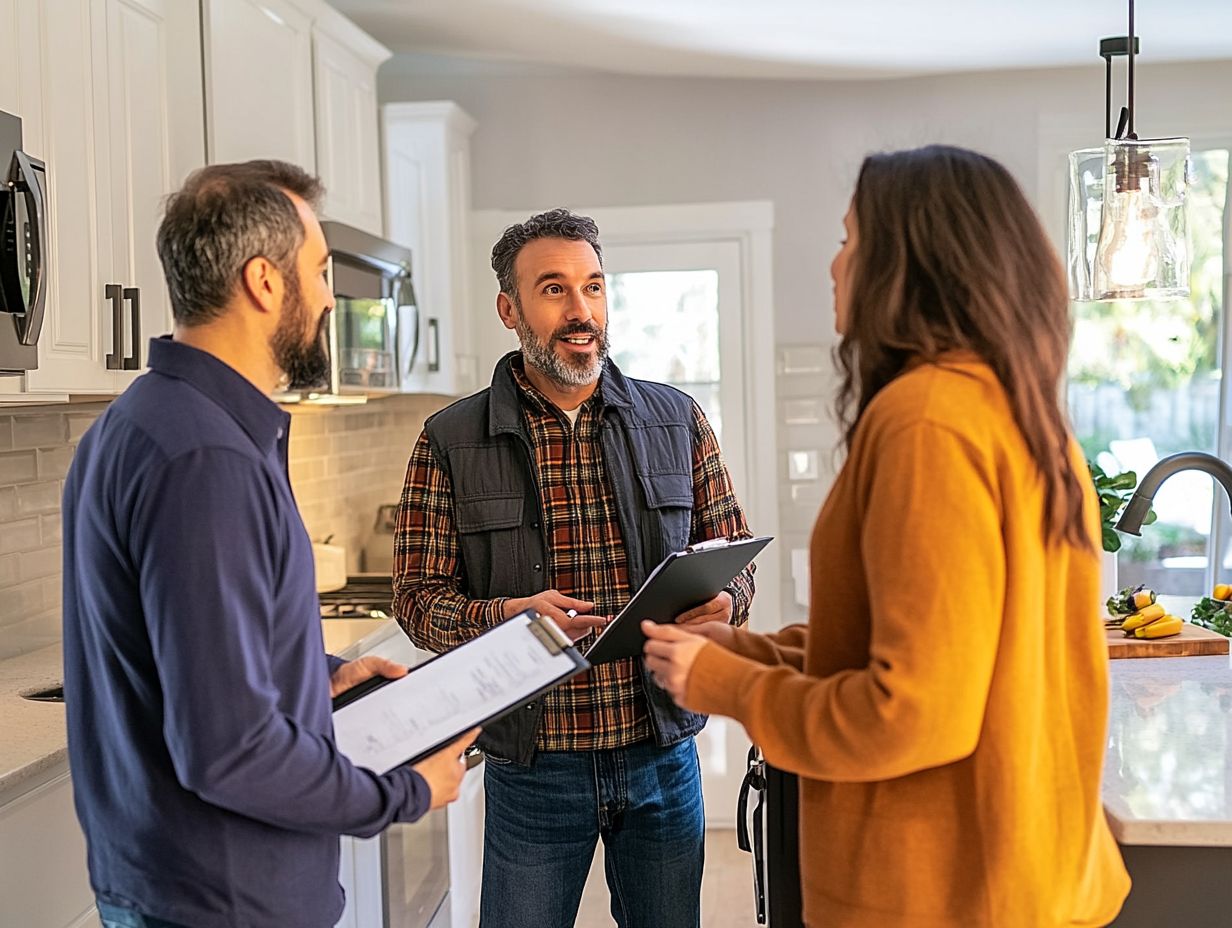
Attending your home inspection allows you to gain a better understanding of the condition of your potential new home and identify any issues that may need to be addressed, highlighting the benefits of attending your home inspection.
How will attending my home inspection guide my purchase decision?
Yes, attending your home inspection provides a thorough understanding of the home’s condition, highlighting the benefits of an independent home inspection and allowing you to make an informed decision on whether to proceed with the purchase.
Can attending my home inspection save me money in the long run?
Yes! Attending your home inspection can help you spot potential issues. For more insights, check out the benefits of a home inspection, as this gives you the chance to discuss a lower price or request repairs before finalizing your purchase.
Will I have the chance to ask questions during the home inspection?
Absolutely! You can ask questions and get clarification on any concerns about the home’s condition.
Can attending my home inspection help me plan for future maintenance and repairs?
Yes! By attending, you’ll gain important insights into what maintenance or repairs the home may need, which is one of the benefits of a seller’s home inspection. This will help you budget for future expenses.
Is it necessary for both buyers and sellers to attend the home inspection?
While not mandatory, both buyers and sellers should definitely attend. It helps everyone understand the home’s condition and makes the transaction smoother.

